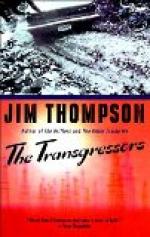“The damning brand of the magnate is on me, and employers are warned against me. And all because I possess a conscience that would not stoop to crime. I have stood out against retaliating as long as I can. Now my vow is given to be avenged on Steel and his ilk.”
Of all the committeemen none has a more distinguished bearing than Professor Herbert Talbot. He is a scion of an honorable New England family; the advantages of refined home surroundings and a college education have combined to give him a polish that should win him the respect and admiration of all who know him.
From the day of his graduation from one of the leading universities he had begun to teach his favorite study, political economy. At fifty years of age he found himself the recognized authority on economics, a professor in his alma mater, and the recipient of honors at home and abroad.
That was in 1894. What a difference a few years has wrought. Now he is an outcast, driven from his position in the faculty by the order of Rufus Vanpeldt, the Woolen King, the patron of the university. Talbot is reviled by his fellow-collegians, and ostracized from the society in which he had always been a leader; and all because he has had the manliness to express the truth on the political conditions of the country.
He has advocated the reduction of the tariff to a reasonable point; he has been a staunch supporter of the income tax; his views on the money question are deemed heretical and he is dismissed from the circles of learning.
From being the submissive hireling and servitor of the educational institution, he entered the political field as their most powerful adversary. He is one of the leaders of the Anti-Trust movement. When the committee of Forty was organized, he had been one of the first selected.
Many of the committee await his speech with lively interest. Whatever view he takes of the proposition they determine to adopt. He is the next member to be called upon.
In an impressive, convincing argument he approves of the proposition. Not that it is faultless, but because it offers the only remedy for the vicious condition of the country’s social condition.
In presenting the arguments in favor of the adoption of the proposition, Professor Talbot demonstrates that the centralization of capital in the hands of a few men is the gravest mistake that a republic can permit to occur. It creates an oligarchy that is more pernicious than one of class distinction, since such a one can be coped with, while an oligarchy of wealth possesses so many ramifications that it is practically unassailable except by direct and physical means.
“It is the common belief that labor-saving inventions are accountable for much of the distress that exists in this country,” he says, “but this is not so in so far as the inventions themselves are concerned.
“The evils that have followed the introduction of labor-saving machinery are the results of capitalists seeking to squeeze the last cent of profit out of their enterprises.




